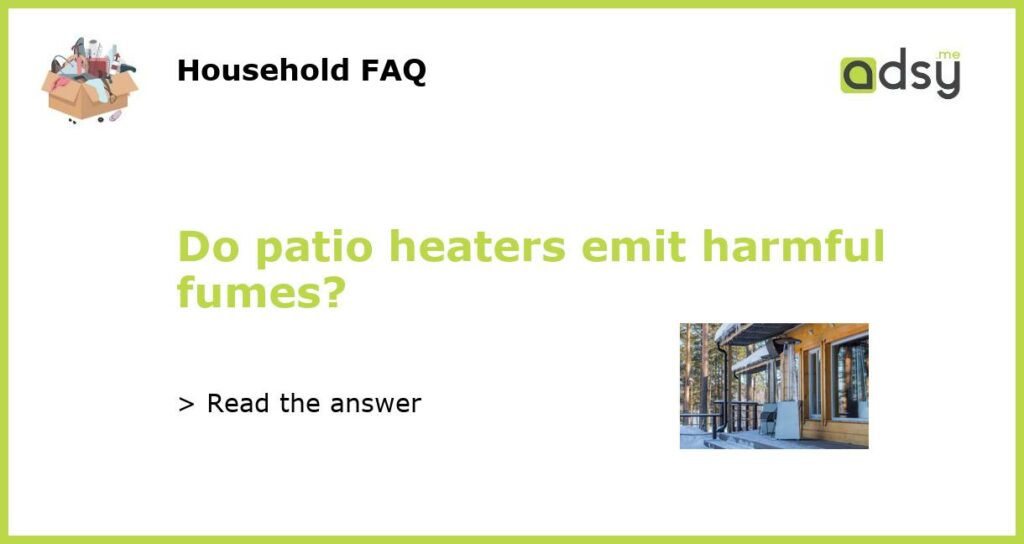h3: What are patio heaters?
Patio heaters are outdoor devices designed to provide heat in outdoor spaces such as patios, gardens, or outdoor dining areas. They can be fueled by either propane gas or electricity and are widely used to extend the outdoor entertaining season. Patio heaters come in various forms, including freestanding heaters, tabletop heaters, and wall-mounted heaters. While they offer warmth and comfort during the colder months, concerns have been raised about the potential emission of harmful fumes.
h3: How do patio heaters work?
Propane-powered patio heaters have a burner at the top that emits heat, radiating it to the surrounding area. These heaters typically consist of a propane tank, a regulator to control the gas flow, and a burner assembly. The propane tank is connected to the burner assembly via a gas hose, and the fuel is ignited to create a flame that generates heat. Electric patio heaters, on the other hand, use a heating element typically made of tungsten or quartz to produce infrared heat. This heat is then dispersed using either a reflector or a fan, providing warmth to the outdoor space.
h3: Do patio heaters emit harmful fumes?
Patio heaters that run on propane do emit combustion byproducts, including carbon monoxide (CO) and nitrogen dioxide (NO2). However, the emissions are usually within safe limits when the heaters are used outdoors in well-ventilated areas. Propane is odorless, but a safety additive called ethyl mercaptan is added to the gas to give it a distinct smell, aiding in the detection of any leaks.
It is crucial to ensure proper ventilation when using propane patio heaters to prevent the buildup of harmful gases. It is recommended to use them in open spaces where there is sufficient airflow to disperse the emissions. It is also advisable to keep patio heaters away from enclosed areas or structures to avoid the accumulation of fumes that could be potentially hazardous.
h3: Are electric patio heaters a safer alternative?
Electric patio heaters are considered a safer alternative to propane-powered heaters in terms of emissions. Since they do not burn fuel, they do not release any combustion byproducts like carbon monoxide or nitrogen dioxide. Electric heaters have the advantage of being cleaner and producing no direct emissions, making them a popular choice for those concerned about the environment.
However, it is worth noting that electric patio heaters still require a power source and use electricity, which may have its own environmental impact depending on the source of the electricity. Additionally, electric patio heaters may have a higher energy consumption compared to propane heaters, which could result in higher energy costs.
h3: Safety precautions when using patio heaters
Regardless of the type of patio heater used, it is essential to follow safety precautions to ensure safe operation and minimize potential risks:
1. Use patio heaters in well-ventilated outdoor areas to prevent the buildup of harmful gases. Avoid using them indoors or in enclosed spaces.
2. Keep patio heaters at a safe distance from flammable materials such as furniture, curtains, or plants.
3. Follow the manufacturer’s instructions regarding proper installation, operation, and maintenance of the patio heater.
4. Regularly inspect the patio heater for any signs of damage or malfunction, and have it serviced by a professional if needed.
5. Never leave a patio heater unattended while in use, and always turn it off before leaving the area or going to bed.
By following these safety guidelines, patio heaters can be enjoyed responsibly, providing warmth and comfort for outdoor gatherings without posing significant health risks from emitted fumes.
Patio heaters, particularly those fueled by propane, do emit combustion byproducts that include carbon monoxide and nitrogen dioxide. However, when used outdoors in well-ventilated areas, the emissions are typically within safe limits. Electric patio heaters, on the other hand, produce no direct emissions and are considered a safer alternative. It is important to take safety precautions such as proper ventilation and distance from flammable materials when using patio heaters to minimize risks. By using patio heaters responsibly and following the necessary safety measures, they can provide warmth and comfort without significant health concerns.






